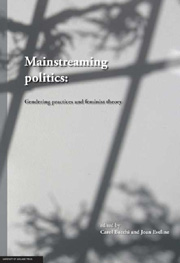Book contents
- Frontmatter
- Contents
- Preface
- Personal reflection
- Publisher's note
- List of authors and project personnel
- Acknowledgements
- Introduction
- 1 Gender/ing impact assessment: Can it be made to work?
- 2 Mainstreaming and neoliberalism: A contested relationship
- 3 Gender analysis and social change: Testing the water
- 4 What are we mainstreaming when we mainstream gender?
- 5 Approaches to gender mainstreaming: What's the problem represented to be?
- 6 Power, resistance and reflexive practice
- 7 Gender mainstreaming: The answer to the gender pay gap?
- 8 Gender analysis and community participation: The role of women's policy units
- 9 The invisibility of gendered power relations in domestic violence policy
- 10 Gender mainstreaming versus diversity mainstreaming: Methodology as emancipatory politics
- 11 University-public sector research collaboration: Mine the space, never mind the gap
- 12 Obeying organisational ‘rules of relevance’: Gender analysis of policy
- 13 Gender mainstreaming or diversity mainstreaming? The politics of ‘doing’
- Conclusion A politics of movement
- Author Index
- General Index
6 - Power, resistance and reflexive practice
Published online by Cambridge University Press: 05 June 2012
- Frontmatter
- Contents
- Preface
- Personal reflection
- Publisher's note
- List of authors and project personnel
- Acknowledgements
- Introduction
- 1 Gender/ing impact assessment: Can it be made to work?
- 2 Mainstreaming and neoliberalism: A contested relationship
- 3 Gender analysis and social change: Testing the water
- 4 What are we mainstreaming when we mainstream gender?
- 5 Approaches to gender mainstreaming: What's the problem represented to be?
- 6 Power, resistance and reflexive practice
- 7 Gender mainstreaming: The answer to the gender pay gap?
- 8 Gender analysis and community participation: The role of women's policy units
- 9 The invisibility of gendered power relations in domestic violence policy
- 10 Gender mainstreaming versus diversity mainstreaming: Methodology as emancipatory politics
- 11 University-public sector research collaboration: Mine the space, never mind the gap
- 12 Obeying organisational ‘rules of relevance’: Gender analysis of policy
- 13 Gender mainstreaming or diversity mainstreaming? The politics of ‘doing’
- Conclusion A politics of movement
- Author Index
- General Index
Summary
Introduction: Joan Eveline and Carol Bacchi
This chapter examines the primary organising processes which produce the meanings of policy statements. It outlines and inspects the social power circumscribing these policy statements, the relations of power and resistance involved in such statements, and their effects on those subject to the policy.
The previous chapter outlined how the WPR approach concentrates on the constitutive effects of existing or proposed policies, showing how the characterising of policy ‘problems’ within those policies or proposals (what the ‘problem’ is represented to be) ‘shapes’ (or constitutes) people as particular kinds of subjects. This chapter pursues the point that policies elicit subjectivities, rather than determine them (Dean 1999: 32). It highlights the always-incomplete nature of subjectification processes, emphasising that the subjects of policy are always more than the products of policy regulation, whether explicit or implicit, as is the case in problem representations. In this view political subjects, both those who ‘do’ policy and those to whom it is ‘done’, are both subjected and resistant to policy discourses. A particular focus of this chapter and of the book is how ‘doing’ policy both produces and enables the subjectivities of those who analyse and develop it, including ourselves as researchers.
The influences of feminist poststructuralism and recent organisational theory shape the propositions in this chapter. It was prompted by our wish as authors to fill a gap in our earlier and later chapters.
- Type
- Chapter
- Information
- Mainstreaming PoliticsGendering Practices and Feminist Theory, pp. 139 - 162Publisher: The University of Adelaide PressPrint publication year: 2010
- 1
- Cited by

